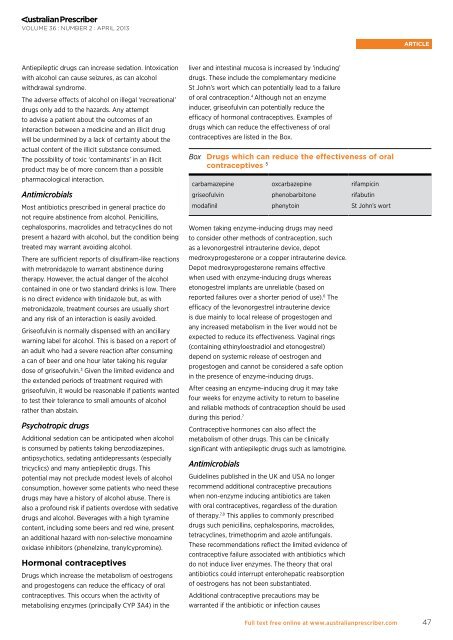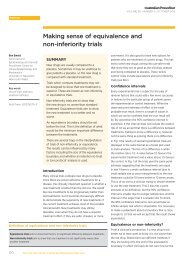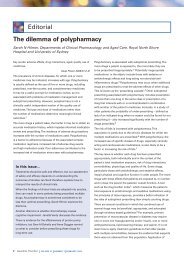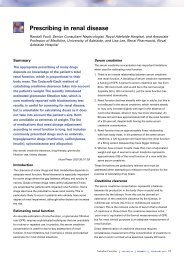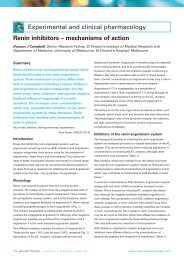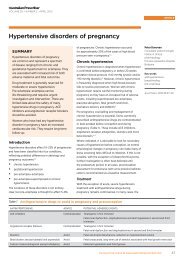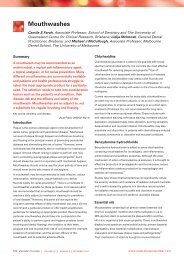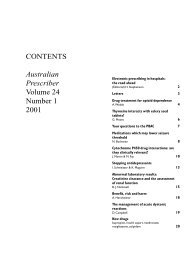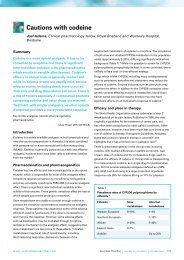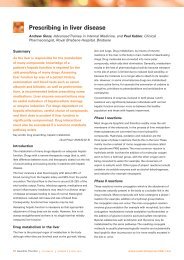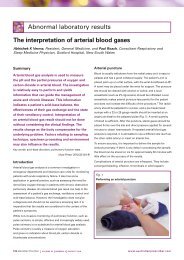Sex, drugs and alcohol - Australian Prescriber
Sex, drugs and alcohol - Australian Prescriber
Sex, drugs and alcohol - Australian Prescriber
You also want an ePaper? Increase the reach of your titles
YUMPU automatically turns print PDFs into web optimized ePapers that Google loves.
VOLUME 36 : NUMBER 2 : APRIL 2013<br />
article<br />
Antiepileptic <strong>drugs</strong> can increase sedation. Intoxication<br />
with <strong>alcohol</strong> can cause seizures, as can <strong>alcohol</strong><br />
withdrawal syndrome.<br />
The adverse effects of <strong>alcohol</strong> on illegal ‘recreational’<br />
<strong>drugs</strong> only add to the hazards. Any attempt<br />
to advise a patient about the outcomes of an<br />
interaction between a medicine <strong>and</strong> an illicit drug<br />
will be undermined by a lack of certainty about the<br />
actual content of the illicit substance consumed.<br />
The possibility of toxic ‘contaminants’ in an illicit<br />
product may be of more concern than a possible<br />
pharmacological interaction.<br />
Antimicrobials<br />
Most antibiotics prescribed in general practice do<br />
not require abstinence from <strong>alcohol</strong>. Penicillins,<br />
cephalosporins, macrolides <strong>and</strong> tetracyclines do not<br />
present a hazard with <strong>alcohol</strong>, but the condition being<br />
treated may warrant avoiding <strong>alcohol</strong>.<br />
There are sufficient reports of disulfiram-like reactions<br />
with metronidazole to warrant abstinence during<br />
therapy. However, the actual danger of the <strong>alcohol</strong><br />
contained in one or two st<strong>and</strong>ard drinks is low. There<br />
is no direct evidence with tinidazole but, as with<br />
metronidazole, treatment courses are usually short<br />
<strong>and</strong> any risk of an interaction is easily avoided.<br />
Griseofulvin is normally dispensed with an ancillary<br />
warning label for <strong>alcohol</strong>. This is based on a report of<br />
an adult who had a severe reaction after consuming<br />
a can of beer <strong>and</strong> one hour later taking his regular<br />
dose of griseofulvin. 3 Given the limited evidence <strong>and</strong><br />
the extended periods of treatment required with<br />
griseofulvin, it would be reasonable if patients wanted<br />
to test their tolerance to small amounts of <strong>alcohol</strong><br />
rather than abstain.<br />
Psychotropic <strong>drugs</strong><br />
Additional sedation can be anticipated when <strong>alcohol</strong><br />
is consumed by patients taking benzodiazepines,<br />
antipsychotics, sedating antidepressants (especially<br />
tricyclics) <strong>and</strong> many antiepileptic <strong>drugs</strong>. This<br />
potential may not preclude modest levels of <strong>alcohol</strong><br />
consumption, however some patients who need these<br />
<strong>drugs</strong> may have a history of <strong>alcohol</strong> abuse. There is<br />
also a profound risk if patients overdose with sedative<br />
<strong>drugs</strong> <strong>and</strong> <strong>alcohol</strong>. Beverages with a high tyramine<br />
content, including some beers <strong>and</strong> red wine, present<br />
an additional hazard with non-selective monoamine<br />
oxidase inhibitors (phenelzine, tranylcypromine).<br />
Hormonal contraceptives<br />
Drugs which increase the metabolism of oestrogens<br />
<strong>and</strong> progestogens can reduce the efficacy of oral<br />
contraceptives. This occurs when the activity of<br />
metabolising enzymes (principally CYP 3A4) in the<br />
liver <strong>and</strong> intestinal mucosa is increased by ‘inducing’<br />
<strong>drugs</strong>. These include the complementary medicine<br />
St John’s wort which can potentially lead to a failure<br />
of oral contraception. 4 Although not an enzyme<br />
inducer, griseofulvin can potentially reduce the<br />
efficacy of hormonal contraceptives. Examples of<br />
<strong>drugs</strong> which can reduce the effectiveness of oral<br />
contraceptives are listed in the Box.<br />
Box Drugs which can reduce the effectiveness of oral<br />
contraceptives 5<br />
carbamazepine<br />
griseofulvin<br />
modafinil<br />
oxcarbazepine<br />
phenobarbitone<br />
phenytoin<br />
Women taking enzyme-inducing <strong>drugs</strong> may need<br />
to consider other methods of contraception, such<br />
as a levonorgestrel intrauterine device, depot<br />
medroxyprogesterone or a copper intrauterine device.<br />
Depot medroxyprogesterone remains effective<br />
when used with enzyme-inducing <strong>drugs</strong> whereas<br />
etonogestrel implants are unreliable (based on<br />
reported failures over a shorter period of use). 6 The<br />
efficacy of the levonorgestrel intrauterine device<br />
is due mainly to local release of progestogen <strong>and</strong><br />
any increased metabolism in the liver would not be<br />
expected to reduce its effectiveness. Vaginal rings<br />
(containing ethinyloestradiol <strong>and</strong> etonogestrel)<br />
depend on systemic release of oestrogen <strong>and</strong><br />
progestogen <strong>and</strong> cannot be considered a safe option<br />
in the presence of enzyme-inducing <strong>drugs</strong>.<br />
After ceasing an enzyme-inducing drug it may take<br />
four weeks for enzyme activity to return to baseline<br />
<strong>and</strong> reliable methods of contraception should be used<br />
during this period. 7<br />
Contraceptive hormones can also affect the<br />
metabolism of other <strong>drugs</strong>. This can be clinically<br />
significant with antiepileptic <strong>drugs</strong> such as lamotrigine.<br />
Antimicrobials<br />
Guidelines published in the UK <strong>and</strong> USA no longer<br />
recommend additional contraceptive precautions<br />
when non-enzyme inducing antibiotics are taken<br />
with oral contraceptives, regardless of the duration<br />
of therapy. 7,8 This applies to commonly prescribed<br />
<strong>drugs</strong> such penicillins, cephalosporins, macrolides,<br />
tetracyclines, trimethoprim <strong>and</strong> azole antifungals.<br />
These recommendations reflect the limited evidence of<br />
contraceptive failure associated with antibiotics which<br />
do not induce liver enzymes. The theory that oral<br />
antibiotics could interrupt enterohepatic reabsorption<br />
of oestrogens has not been substantiated.<br />
Additional contraceptive precautions may be<br />
warranted if the antibiotic or infection causes<br />
rifampicin<br />
rifabutin<br />
St John’s wort<br />
Full text free online at www.australianprescriber.com<br />
47


